
7 Books About Codependency to Help You Better Understand the Condition
The spectrum of codependency is broad and diverse — no single book can comprehensively tackle all of its aspects. Thus, finding books about codependency can be difficult for those who want to know about and understand the condition, much less their specific condition.
Currently, having a codependency is not something health professionals can diagnose. It took me years to realize that I have it in the form of unhealthy attachments: I used to get easily attached to people I met. In 2016, fresh from college, lonely, and naïve about the world around me, I became emotionally close to a colleague who had become a friend. When I left the company, I couldn’t help but feel sad that I shed tears walking out of the office one last time. At the time, I thought that I won’t be able to hang out with them anymore. But it turned out that the ex-colleague cut off ties with me after I sent them an invite to hang out. I thought we were becoming friends — but boy, was I wrong! All I wanted during that time was a friend, but it got my heart broken instead. Woe is me. So I fell down the melancholy spiral for many years, chasing that accompaniment.
I wondered what’s wrong with me and went to Google for answers about this strange feeling. Lo and behold: I showed clear signs of codependency. Since then, I read self-help books about the subject and felt that I became more aware of the signs and how to curb them. The experience was enlightening, to say the least. I also cultivated a deep self-love to not needlessly chase other people. And with a great support system, I became significantly less codependent in my relationships.
Obviously, my experience differs with that of other people. Since the topic of codependency is extensive, its types can include a spiral into alcoholism, abuse, and toxic relationships in marriages and between family members. If you’re struggling to find out whether you may have it, I have seven diverse books about codependency below to keep your mind on the signs and to know what can you possibly do about them. If the condition is more serious, however, I suggest that you work with a professional in order to recover.
In essence, seeking books about codependency is just half the battle as books may only provide self-awareness. What can possibly help is a triad of books, therapy, and Co-Dependents Anonymous (CoDA) meetings. Still, don’t underestimate the power of self-help literature during this uncertain stage.
And with that, here are the best books on breaking codependency.
Books About Codependency
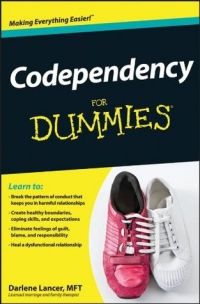
Codependency for Dummies by Darlene Lancer
“If you’re reading this book because you wonder whether you are or may be codependent, you’re not alone,” opens the author in the introduction. If you feel that you have codependent tendencies, this book may provide answers, such as why you may have become codependent. In addition, if you’re not familiar with the signs of codependency, it may also help you become self-aware.
In Codependency for Dummies, the author tries to define what codependency is, aiming for a comprehensive book about the subject. Once knowing more about it, the author also provides some advice on how to recover through helpful exercises. “I decided to organize the book the way you’d experience embarking on recovery — first understanding the definition, symptoms, and causes, and then the evolving process of changing and healing,” she writes.
This is a must-read for anyone who want to read up on codependency but don’t know where to start. On the r/Codependency subreddit, it’s one of the most recommended resources when users ask for books about codependency.
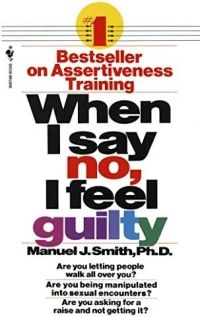
When I Say No, I Feel Guilty by Manuel J. Smith
My codependency traits used to feel like this, too. When I’d turn down a friend’s invitation to meet up, I’d feel guilty. I’d think they’d get angry. I know I shouldn’t be, so I wanted to find out why. I wanted to know why I felt that way.
In the book, the author prefaces with a “Bill of Assertive Rights,” which includes self-assurance phrases like “you have the right to judge your own behavior, thoughts, and emotions, and to take the responsibility for their initiation and consequences upon yours” and “you have the right to make mistakes — and be responsible for them.” Mostly, the book grounds itself in a process called systematic assertive therapy, which, according to the author, is “how to cope with life’s problems and conflicts and the people who present them to us.” Most of the book’s content are based from his and his colleagues’ experiences. He hopes that this book will shed light on the coping process of people with this condition.
The book is full of lessons that, since codependency may involve emotional abuse, includes ways on how people manipulate us, how to cope up with that and be assertive, learn how to say no, and more. It’s very enlightening.

On Relationship by Jiddu Krishnamurti
Jiddu Krishnamurti was a prominent guru from India. He was known for his wisdom in different aspects of life, especially love and relationships.
Though On Relationship is not strictly a book about codependency, the concept of self-love and managing relationships are its central themes. In the book, Krishnamurti has written essays from 1940 to 1982 in different parts of the world. “I think most of us know what it is to be lonely. We know that state when all relationship has been cut off, when there is no sense of the future or of the past, a complete sense of isolation,” he writes of loneliness in one entry. “And the instinctive reaction is to turn away from it,” he addresses readers and then provides some advice afterward.
In another entry, he seems to write about attachment: “In what we call love there is dependence, the sense of attachment that comes from loneliness, insufficiency in oneself, not being able to stand alone, therefore leaning on somebody, depending on somebody.”
This book is a delight to read; Krishnamurti’s essays are very insightful and inspiring.
Books About Codependency in Marriage
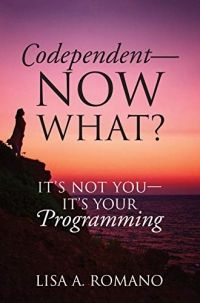
Codependent, Now What?: It’s Not You, It’s Your Programming by Lisa A. Romano
Aside from demystifying codependency, the author provides ways on how to possibly conquer it.
In the book, she draws on her harrowing experiences: from the time she and her husband divorced, and when she used to seek his and her alcoholic parents’ approval. According to her, these experiences sent her in a downward spiral. “At times the things that I discovered brought me to my knees,” she writes. But then, the ensuing realizations helped her discover the culprit: that she’s codependent. She worked hard to overcome it since then.
With this book, she hopes to help readers to “discover the dysfunctional thought patterns and belief systems that may be preventing you from living the life you deserve” by providing strategies that will “help you dig deep into your past…” She says that the problem is not the people with codependency, but rather their “programming.”

Set Boundaries, Find Peace: A Guide to Reclaiming Yourself by Nedra Glover Tawwab
The book focuses on an aspect of being codependent: boundaries. It explains what boundaries are, their importance, why we don’t have them, what they look like, etc. It also offers advice on how to enforce these boundaries to relationships, whether that’s family, friends, romance, work, and social media.
“This book will break down the many aspects of having healthy boundaries and offer insights into how we can honor the boundaries set by others,” writes the author-therapist in the preface. She draws on her experience of not having boundaries, making her life “overwhelming” and “chaotic.” She hopes that by reading this book, readers who experience similar dilemma can give themselves confidence and courage to create healthy boundaries in their own lives.
Books About Codependent Parents
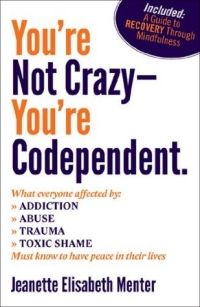
You’re Not Crazy, You’re Codependent: What Everyone Affected by Addiction, Abuse, Trauma Or Toxic Shaming Must Know to Have Peace in Their Lives by Jeanette Elisabeth Menter
In the book, the author says that she experienced codependency herself by being “raised by an alcoholic father and a neurotic, enabling mother.” She relies on her experience and what worked for her. “Parts of it are very personal. I’m putting my life on the page for all to see,” she writes in the Introduction. Though she admits that she’s not a professional who extensively studied about the subject, she offers a different perspective.
In it, she also says that the word codependency is overused, misunderstood, and still unknown to many. According to her, while professionals who studied it agrees on its characteristics, she believes that it’s an influence of addiction, abuse, trauma and/or shame-based upbringing or relationship, which she explores here.
The book has religious undertones, as the author prefaces by saying that God is instrumental in her healing journey. If that’s not for you, you may try other books in this list.
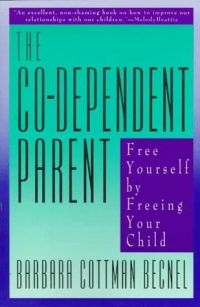
The Co-Dependent Parent: Free Yourself by Freeing Your Child by Barbara Cottman Becnel
Somehow, I can relate to this, since I think that my mom can be codependent with me. Though I’m already an adult and live on my own, she always asks me where I am and what I do. This is typical in Asian families, but I still wanted to understand this behavior.
In this book, the author recounts her experience of pleasing her family members, doing whatever they want. She says that she was codependent from two victims of codependency. Through interviews with other families who experienced the same thing, the author also lists the various types of codependency that runs among families: a controlling parent, an overprotective parent, a demanding parent, and a critical parent among others. Exercises to make them aware of these behaviors are also included.
Though the book is written with parents in mind — and with the objective of helping them and their child — there are sections that are addressed to the child as well. Recovery, after all, is a two-way street.
The first step to breaking codependency is to be aware of its signs. As for me, it’s very enlightening and freeing to be able to know more about myself and uncover past trauma I may have experienced. I hope that these books about codependency will be beneficial on your road to recovery.
For more readings on complicated relationships, here are 10 Books About Abusive Relationships, 10 Books About Complicated Father-Daughter Relationships, and 50 Must-Read Books About Complicated Marriages.











